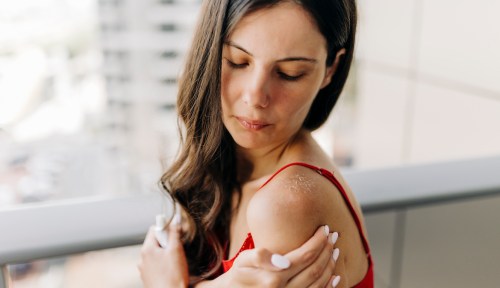Summertime can mean fun and all things outdoors, but for those suffering from psoriasis—a skin condition marked by red, scaly patches that itch and burn—showing more of your skin can leave you feeling vulnerable. But it’s not all bad news: Summer is known to bring relief to psoriasis sufferers, because ultraviolet (UV) rays, specifically UVB, have anti-inflammatory properties that have been shown to improve those patchy, itchy bumps.
“The added moisture in the air helps prevent plaque psoriasis patches from cracking, and can provide symptomatic relief from pain and itch,” says Mona Shahriari, MD, an assistant clinical professor of dermatology at Yale University School of Medicine, partner at Central Connecticut Dermatology, and President of the Connecticut Society of Dermatology and Dermatologic Surgery. “Moreover, the warm weather can lessen psoriatic joint pain in those individuals with concomitant psoriatic arthritis.”
But! That doesn’t give those dealing with psoriasis a free pass to bake in the sun all day. Too much sun and not enough protection can have the opposite effect and trigger flare-ups. And other warm-weather aspects—like sweat, bug bites, allergies, and excessive heat—can leave skin irritated and uncomfortable.
So, what’s the best way to navigate the summer months? We asked the experts who shared their best tips and tricks for managing psoriasis this summer season, and explained how to use that extra sunshine to your advantage.
What is psoriasis, and what treatments are available?
Broadly speaking, psoriasis is a skin condition that manifests in different ways, but commonly includes itchy, scaly plaques on elbows, knees, and other parts of the body. Psoriasis is a chronic condition that can worsen or improve over time, but there is no cure, says Alexa Mieses Malchuk, MD, MPH, district medical director and board-certified family physician of One Medical.
“Psoriasis can affect one small part of the body, or cause a rash to occur in many different body parts at once,” she says. “People with psoriasis may notice that certain weather patterns, eating habits, and stress levels can impact their condition. Luckily, there are a broad array of treatments for psoriasis.”
The most common treatments include keeping skin moisturized and applying topical steroid creams, similar to the ones used for eczema. Dr. Mieses Malchuk adds that there are other non-steroid options as well, including pills, ointments, and injections that target different parts of the immune system to improve psoriasis symptoms. While prescription medication is often necessary, there are some things you can try at home to help control psoriasis. “For example, coal tar extract is available over-the-counter and can be applied in the shower,” she says. “Sun exposure can also help symptoms, as can minimizing stress and eating more plant-based foods.”
How to prevent psoriasis in the summer
1. Swim in saltwater
If you’ve got plans to visit the beach this summer, be sure to take a dip in the ocean. Going for a swim in salt water can break down the thick skin plaques caused by psoriasis, and allow sunlight to target the inflammation underneath. It can also help remove dead skin and improve the appearance of plaque psoriasis. But be warned, the chlorinated water in most pools can dry out the skin, so it’s best to skip those or limit your time in them. Dr. Shahriari recommends applying a thick moisturizer to your skin prior to going in the water, as this forms a shield against the drying effects of the water. Rinse off immediately after swimming and re-apply moisturizer to maintain the health of your skin.
This Parisian Skincare Brand Is Launching in the United States for the First Time—Here’s What a Derm Wants You to Know

We’re Calling It: Cleansing Balms Are the Face Wash of the Future—Here Are 3 to Add to Your Cart

This Is the One Product That Scarlett Johansson Always Keeps in Her Purse and on Her Bedside Table

2. Protect your skin from sunburns
Safe sun exposure can reduce inflammation from psoriasis, but too much sun can cause sunburns which can trigger a flare-up. Dr. Mieses Malchuk recommends applying sunscreen with at least an SPF of 30 and broad-spectrum protection (protecting against both UVA and UVB rays) to any exposed areas of skin, including any psoriasis plaques before sitting out in the sun.
3. Lean into your vacation
Anxiety can worsen psoriasis symptoms, so take advantage of your summer travels and enjoy the time off to relax and relieve stress. If you’re leaving town, be sure to pack enough of your prescription medicines and over-the-counter products, including moisturizers. This can help you manage any flare-ups while you’re away.
4. Take advantage of AC (but remember to moisturize regularly)
Dr. Mieses Malchuk says that heat and excess sweat can cause psoriasis to flare so take advantage of any air conditioning you can find. However, air conditioning can dry out the skin, so be sure to slather on a heavy moisturizer before you bask in the cool air. “Moisturized skin can improve the appearance of dry, scaly patches on the skin, and decrease itching,” she says.
5. Choose breathable clothing
Pull out your favorite flowy dresses and breathable cotton shirts, as these are the best types of clothing to wear if you suffer from psoriasis. The lightweight materials don’t stick to the skin, which makes them less likely to cause itching and discomfort.
Dr. Shahriari says that it is worth noting that these summertime recommendations may not apply to everyone’s unique skin, so it’s important to consult with a dermatologist to develop a summer treatment plan and determine appropriate ways to enjoy the weather.
Sign Up for Our Daily Newsletter
Get all the latest in wellness, trends, food, fitness, beauty, and more delivered right to your inbox.
Got it, you've been added to our email list.







